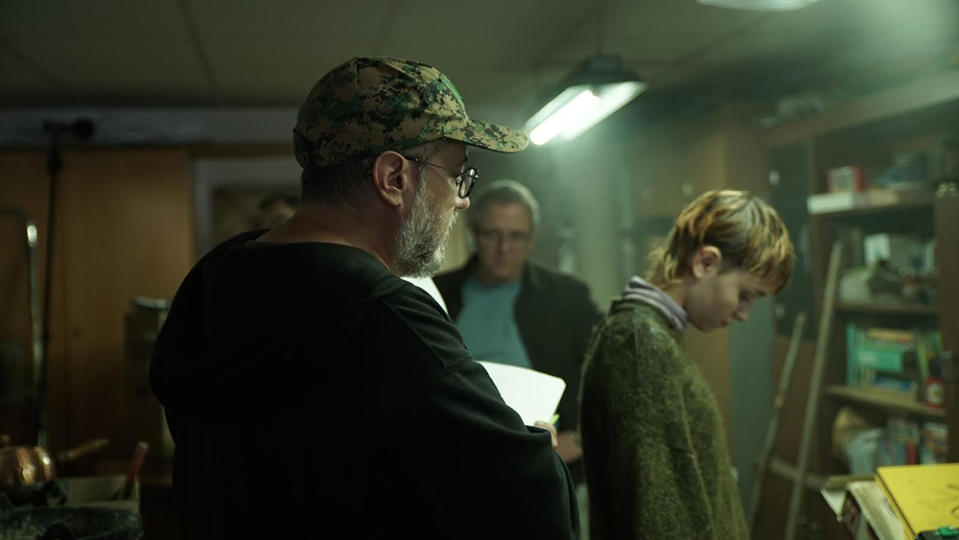Spain’s Álex Montoya Talks Málaga Competition Title ‘La Casa’: Adapted From Paco Roca’s Eisner-Winning Graphic Novel
- Oops!Something went wrong.Please try again later.

A myriad of sentiments converge when estranged siblings meet to unpack the weight of their father’s recent death in Spain’s Álex Montoya’s third feature “La Casa,” adapted from the Eisner-winning graphic novel by Paco Roca and sold by Latido Films.
The film, which bowed last night, figures in the official competition selection at this year’s Málaga Film Festival, his project “Lucas” having previously swept the fest’s Zonazine sidebar in 2020 – snagging best film, actor (Jorge Motos) and Audience Award plaudits.
More from Variety
Written by Montoya and Joana M. Ortueta, the project serves as a bittersweet rumination on regret, duty and the ties that bind us, proving a reflective journey through collective consciousness that’s held to task as the three work to rekindle a semblance of affection while sifting through hefty and lingering recollections.
“I’ve been a comic reader for as long as I can remember and, as such, I’ve followed Paco’s work closely,” Montoya told Variety. “I was surprised by ‘La Casa,’ by its ability to move with a very clean, apparently simple story. The passage of time, memory and legacy have been treated a thousand times on the screen, but Paco’s work did so in an especially effective way, so I quickly decided to acquire the rights,” he explained.
Produced by Valencian production outfits Raw Pictures (“Lucas”) and Nakamura Films (“Stanbrook”), the project is a faithful execution of Roca’s softly-etched depictions of life and the stifling passage of time. Neutral, warm tones, dust barely settled and withered vegetation complement the portrait of a lived-in but neglected homestead. Frank dialogue and silence mingle on-screen, accomplishing a wistful rendition of Roca’s broadly engaging work.
“I acquired the rights instinctively, but it took me a lot longer to decode how the story worked internally so I could adapt it. Paco gave us a lot of freedom when it came to writing, but we still consulted him about changes to the script, because for us he was viewer 0, the representative of thousands of comic fans around the world,” Montoya admitted.

“The aesthetic and tonal fidelity of the film responds to that, to allowing comic book fans to enter our film without resistance, which gives us some room for small changes in structure and script,” he added.
Steeped in nostalgia, the film captures the uneasy yet comforting sensation of returning home. Every item stumbled upon recalls a memory that’s been etched in stone, paying homage to the past while emotions cloud-up the present. Flashbacks frame histories deftly and allow a glimpse of the family dynamic, cast up on the screen as if from a delicately worn projector.
“Analyzing the comic, I realized that one of its strong points was the juxtaposition of real time and memory,” Montoya stated.
“I did several tests on how to translate this to the screen and in the end I realized that I don’t remember things vividly. My memories are abrupt images, mixed, reimagined, almost as if seen through an old periscope. That’s why I decided to frame them in a small central box and give them a texture similar to Super8,” he relayed.
The cinematography lends a fly-on-the wall sensation. An audience is placed to peer from behind the leaves of terrace plant life, across vacant rooms of the home and toward the mirror image displayed via the black screen of a burnt-out vintage television. Each shot lends an intimacy that serves a narrative focused on reflection, inviting the spectator to join the bereaved family as they sort through their psyches.
“Film aesthetics and cinematic calligraphy are very important to me. In my opinion, it’s one of the most effective ways to anchor the film in the viewer’s mind. The specificity of a precise frame in a real location, with a specific sound and light, stealthily addresses our subconscious,” Montoya opined. “In ‘La Casa’ we were very lucky to access the location the comic is based on, which gave the filming a weight and authenticity that’s reflected on the screen.”
The cast includes Goya-winner David Verdaguer (“Jokes & Cigarettes”), Luis Callejo (“Valley of the Dead”), Óscar de la Fuente (“The Good Boss”), Olivia Molina (“Bajo Sospecha”), María Romanillos (“The Consequences”), Lorena López (“Los cómplices”), Marta Belenguer (“Asamblea”), Jordi Aguilar (“The Bar”), Miguel Rellán (“Tata Mía”) and Tosca Montoya.
Best of Variety
Sign up for Variety’s Newsletter. For the latest news, follow us on Facebook, Twitter, and Instagram.

